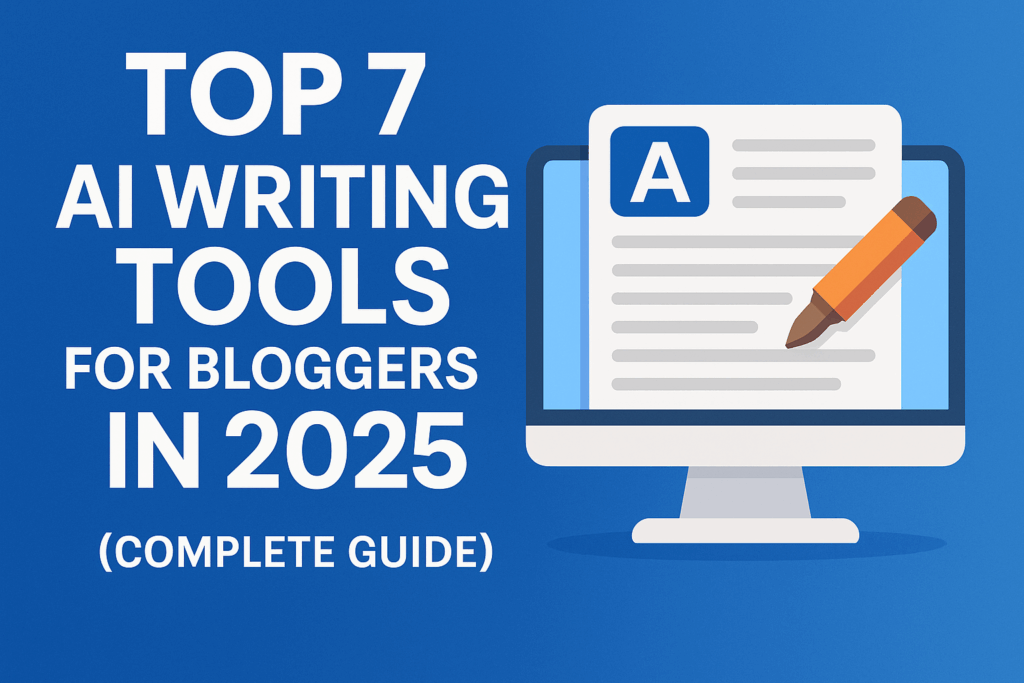When I first started blogging years ago, I thought writing would always be the hardest part. But the truth is, it wasn’t just the writing—it was everything else. Coming up with fresh ideas, structuring posts, optimizing for SEO, and publishing consistently drained more time than I expected.
Fast forward to 2025, and the landscape looks very different. AI writing tools have matured to the point where they don’t just help with words on a page—they help with the entire workflow. From brainstorming to drafting, from SEO optimization to content repurposing, these tools have become indispensable for bloggers who want to keep up in such a competitive space.
In this guide, I’ll share the 7 best AI writing tools for bloggers in 2025. I’ve personally tested most of them, and each one brings something unique to the table.

1. Jasper – The All-in-One Copywriting Powerhouse
Jasper has been a leader in AI copywriting for years. What makes it so powerful in 2025 is its deeper integration with search intent and keyword data. You can generate blog outlines, intros, full drafts, and even social snippets—all tailored to ranking better in Google.
I use Jasper when I need to publish multiple posts in a week without sacrificing quality. Its templates make it easy to keep tone and structure consistent.
2. Copy.ai – The Idea Generator
If you’ve ever stared at a blank page with zero inspiration, Copy.ai feels like a lifeline. It’s designed for speed and creativity. You enter a topic, and it spits out headlines, intros, and even content angles you might not have considered.
For me, Copy.ai works best at the brainstorming stage. It doesn’t replace my writing, but it gets me past creative blocks when I feel stuck.
3. Writesonic – SEO-Friendly Long-Form Content
Writesonic’s “Article Writer 5.0” is built for bloggers who care about SEO. It creates long-form posts complete with headers, meta descriptions, and keyword placements.
I tested it for a 2,000-word article on digital marketing, and it delivered a surprisingly polished draft that only needed light editing. For anyone who wants to balance speed with optimization, this is one of the best AI writing tools.
4. Rytr – Affordable and Simple
Not everyone wants to spend a fortune on AI software, especially beginners. That’s where Rytr shines. It’s lightweight, affordable, and easy to use.
I recommend Rytr for new bloggers who want to experiment with AI writing without committing to expensive subscriptions. Its free plan is limited, but still enough to produce simple blog posts and social content.
5. Anyword – Data-Driven Copy
While most AI writing tools focus on generating text, Anyword focuses on performance. It predicts how headlines, CTAs, or paragraphs will perform with your audience.
I used it for testing different blog titles, and the prediction scores actually lined up with my traffic data. If you care about conversions and results, Anyword is a smart investment.
6. CopySmith – Built for E-Commerce Bloggers
CopySmith is designed for online stores and affiliate marketers. It generates product descriptions, ad copy, and promotional emails that are SEO-friendly and conversion-focused.
I recommend it for bloggers who run niche product sites or write reviews. It takes the grunt work out of writing dozens of product blurbs.
7. ChatGPT (OpenAI) – The Versatile Assistant
Last but not least, ChatGPT remains one of the most flexible AI writing tools. It can draft full blog posts, create outlines, generate SEO keywords, and even assist with research.
What makes it stand out in 2025 is the ecosystem—plugins, integrations, and custom instructions. I use ChatGPT not only for drafting but also for brainstorming content strategies.
Why AI Writing Tools Matter for Bloggers
Here’s the truth: blogging is no longer just about writing well. It’s about publishing consistently, optimizing for search, and engaging readers with content that stands out. That’s a lot to handle manually.
AI writing tools don’t replace human creativity, but they amplify it. By automating repetitive tasks—like drafting intros, generating meta descriptions, or formatting posts—AI frees up your mental energy for strategy and storytelling.
Consistency is also key for SEO. Google rewards sites that post regularly, and AI makes that sustainable without burnout.
Final Thoughts
The blogging world in 2025 is faster, noisier, and more competitive than ever. But that doesn’t mean smaller creators are doomed. With tools like Jasper, Copy.ai, Writesonic, Rytr, Anyword, CopySmith, and ChatGPT, bloggers can keep pace with bigger players while still focusing on creativity.
The best part? You don’t have to choose just one. Test different platforms, see which fits your workflow, and combine automation with your unique voice.
Because at the end of the day, readers don’t come for AI—they come for you. And when AI handles the heavy lifting, you can finally focus on what really matters: telling stories, building trust, and growing your audience.